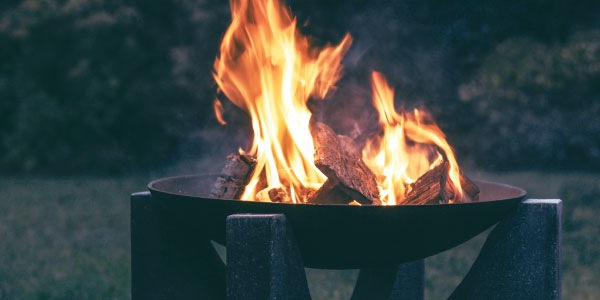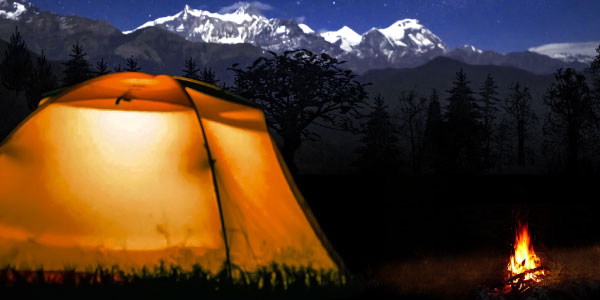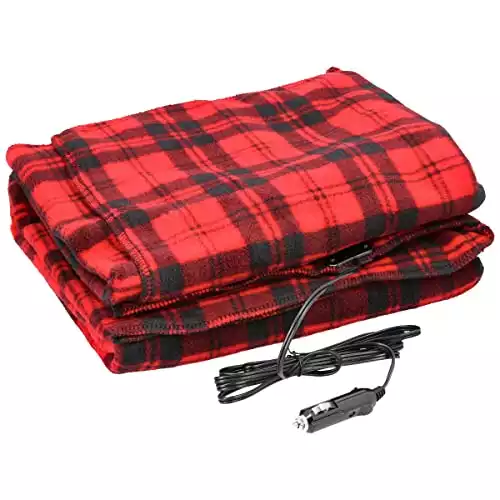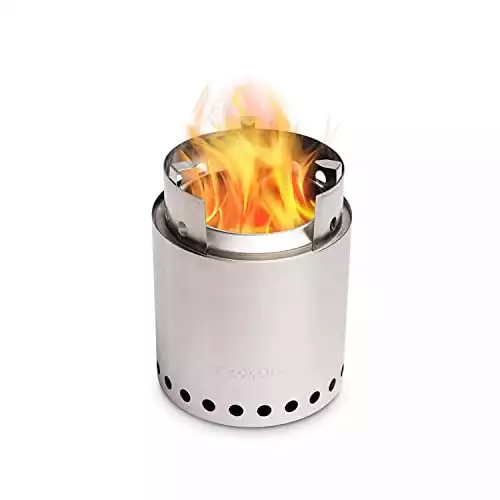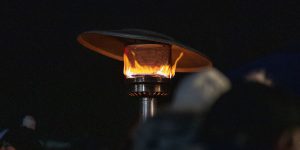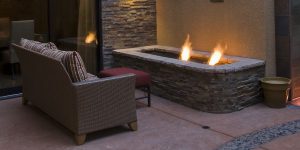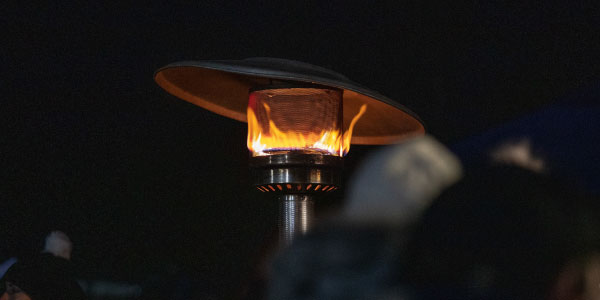

There are many types of outdoor camping heaters you can buy, each with its own pros and cons.
We look at each, what they are used for, and the safest way to stay warm at night when camping out in all-weather terrain.
Because, of course, when you ask what’s the safest heater for camping, you also need to look at what’s practical. You won’t always find a plug for an electric heater or even need heating inside the tent.
If you’re a little more eco-conscious, then you might want to take a look at our eco-friendly ways to keep warm when camping post, covering a variety of different areas and bonus tips.
How Safe Are Portable Heaters?
The safest way to stay warm on a camping trip is to invest in a good tent, a great sleeping bag, and plenty of layers. That’s a given, and if you want some hints and tips on how to stay warm when camping, you may want to go read that post.
But sometimes, you need an extra boost to keep the chill off the night air or warm up the tent before heading to bed. Either way, make sure that all heating devices are turned off before you go to sleep to keep everything as safe as possible.
Portable Gas Heaters – Safe(ish)
Butane or Propane gas heaters will generally emit carbon monoxide, which is why gas heaters should always be used in well-ventilated areas and never left unattended.
That said, when you are out in the middle of nowhere, a gas bottle and a lightweight stove can help keep the chill away and brew you a nice cup of something warm.
Pros
- Easy to use and carry
- If using to heat up an indoor, find a gas heater with a low oxygen detection safety feature
- Powerful heat, fast
Cons
- Do not leave on whilst sleeping
- It will only last for as long as you have gas
Electric heaters and blankets – Safe
These are obvious solutions. They use clean energy, are the most eco-friendly heaters around, and will generally have plenty of safety features that mean they shut off if they get too hot/tip over/temperature is reached.
An auto-shutoff timer is critical, and if you are looking to heat a large space, get yourself an oil radiator that will give you the most energy and heat without breaking the voltage bank.
We can give much the same advice for electric blankets, which are actually the safest way to heat a tent through the night.
This 12-volt polyester heated blanket plugs into car outlets, providing warmth during trips. It features a 96-inch cord, is lightweight, compact, and ideal for travel, camping, or emergencies. Spot clean only.
Pros
- Automatic shutdown on a timer
- Overheat protection so it shuts down if it gets too hot
- Tip-over protection
- Multiple heating levels
- You can keep the blanket on through the night, and turn it back on when you need it
- The safest indoor camping heating solution
Cons
- You have to camp where there’s a plug. It’s not exactly wild, but it’s definitely safe
- Blankets are night time only – won’t help keep the cold at dinner or breakfast
- Radiators and electric heaters will quickly lose heat once they are shut off
Halogen Heaters – UNSAFE
We have to put these on the list because they are recommended on some camping websites. After all, you can find some small models for cheap.
However, OutdoorGardenHeaters.com are all about finding the best way to stay warm outside, and we would NOT recommend Halogen Heaters for the wilderness.
While they can keep you warm, hanging over your head on a pergola, or screwed onto your walls, there’s a reason why once you have these up, they stay put.
Pure and simple, they get very hot and can cause a fire risk, especially if you are camping in forest areas.
However, the only exception is if you like camping in a motor home, caravan, or heading to a glamping site with all the mod cons. At this point, you could use these to give you a little extra warmth in the safety of the indoors.
Pros
- Lots of heat
- Great patio heaters
- Great for caravans, motorhomes, glamping or cabins
Cons:
- They get very hot
- Can cause forest fires if left unattended or tip over
- Keep away from children and pets
Fire Pits – Sorta Safe?
We love a well-placed fire pit. It’s the most basic and easiest way to get warm – nothing beats the warmth of a good fire.
But you need to know how to get it going, control it, and have the necessary kit to extinguish it in an emergency. We are talking mini fire extinguishers and a decent portable fire pit that will keep cinders and ash off the ground.
Fire pits are an outdoor solution only – never start a fire indoors or in a confined or covered space. They are there to allow you to cook and keep warm before retiring to your nice warm sleeping bag, and that’s about it.
The Solo Stove Campfire, recommended by Backpacker Magazine, features a patented design for clean burning, uses natural fuel, boils water in 2-4 minutes, and is compact, lightweight, and made of premium materials.
Pros
- Easy to set up and pack up
- Nothing warms like a flame
- Can be used as a BBQ grill
- Folds away neatly
- Mesh safety guard keeps ember away from the ground
Cons
- It’s a fire. Don’t let children or pets near it
- You need a well-ventilated area
- Not an indoor heating solution
- You get that smoke smell on all your clothes
What to look for when buying a camping heater:
Didn’t see anything you liked above? Why not take a look at our portable outdoor heaters or our gas Vs electric camping heaters posts?
Or maybe we’ve given you an idea of what you are looking for and want to keep doing your own research. That’s absolutely one. Just keep these 5 points in mind:
1. What are the safety features?
You could find a heater that keeps you as warm as a hot summer’s day, but if it blows up and burns everything around it, there’s not much point in buying it in the first place.
When buying gas or electric heaters, look for models that have handles that make them easy to carry and a bigger base to keep them stable on uneven ground. Many will have safety features, such as a tip-over switch, a low oxygen detection system, and a cool outer casing.
2. What’s the heating output
You want warmth, but not if it will trip the power supply on your camping grounds. For electric heaters, probably best to stick at around the 2,000 Watts heat output – hot enough to warm a winter tent, not so hot to cause a blackout.
Equally, make sure your gas portable heater has at least 1.5KW of heat output – aimed in the right direction to keep most people toasty and warm.
3. How big is it?
Size is important. If the heater makes it, but there’s not enough space for the tent, you’ll be frozen on the ground even if the heater is a meter from your face.
Buy a heater suited for your mode of transport and your tent size. If you only have a two-person tent, you can afford to bring a small compact electric heater, but a portable electric radiator may be your best bet if you are trying to heat a six-person tent.
4. The danger of Dual-purpose
Many electric heaters will boast that they fan around hot air in the winter and cool air in the summer. That’s what dual-purpose electric heaters mean.
If you’re not careful, you’ll end up with a cheap model that does neither thing very well. Generally speaking, you’ll find that they are good heaters but only blow a vague amount of cool in the summer.
If you are going for a dual purpose, don’t go cheap and invest in a good model. If you are on a budget, focus on what’s more important – getting the best camping heater.
You can always grab a magazine and use that as a fan on the way.
5. Does it have thermostatic control?
This writer lives in the UK, and if there’s one thing the Brits know for sure, you can’t rely on the weather. If you are camping in the snowy mountains of Oregon or the beaches of Australia, you will need very different heat outputs.
Your best bet is to get a portable heater with multiple heat settings. You can use it throughout the seasons and throughout the changing weather.
Isn’t that why we seek out safe camping heaters? So that no matter the weather or the season, you can head out to the great outdoors.

